Story 8: Anonymous
On September 30, Russian troops broke into a house where a 16-year-old teenager (we keep his name anonymous), lived with his grandmother. It was late at night and there was no reason for such vandalism.
Editorials
Since February 24, 2022, when Russian troops invaded Ukraine, parts of the territories in the North, South, and East have been seized. Following the establishment of the occupation regime, they resorted to historically known criminal methods: murder and rape of civilians, looting, and destruction of infrastructure. Additionally, they have used the deportation of civilians, a hallmark of genocide.
The Russian authorities meticulously prepared for this, developing methods for population deportation, constructing temporary accommodations for deportees, and securing funding for their upkeep. Central to this is the religious and ideological reprogramming of forcibly deported Ukrainians, with a special focus on the “re-education” of children, involving the Russian Orthodox Church. Documentation supporting these facts is presented below.
The cooperation between the Russian Orthodox Church and Russian Federation authorities is not new. In 2017, Patriarch Kirill of Moscow signed a cooperation agreement with Vladimir Puchkov, head of the Ministry of Emergency Situations. After Russia launched the full-scale war against Ukraine, Bishop Panteleimon, Chairman of the Synodal Department for Charity and Social Service of the Russian Orthodox Church, met with Lieutenant General Oleg Manuylo, Director of the Department of Civil Defense and Population Protection of the Russian Emergencies Ministry, in March 2022. Their discussion centered on the terms of cooperation between the Church and the Ministry.
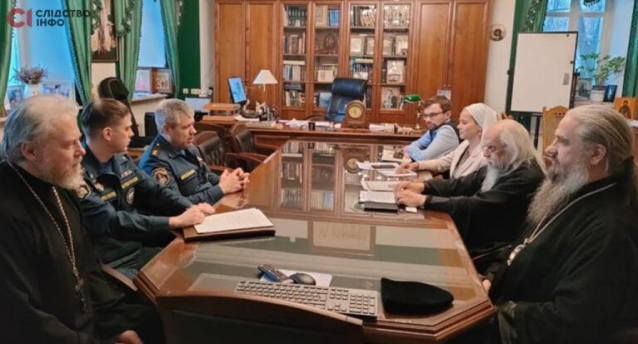
(Bishop Panteleimon at a meeting with Lieutenant General Oleg Manuilov discusses cooperation between the Ministry of Emergency Situations and the Russian Orthodox Church)
This cooperation plays the crucial role, as the Department of Church Charity and Social Service received all documents regarding the so-called “evacuation” from Ukrainian territories occupied by Russia. These include the number of “evacuated” individuals, train schedules for transport to Russian territory, and information on the distribution of evacuees in temporary accommodation centers. Also, Polina Yuferyeva’s email address, who coordinates the Russian Orthodox Church’s emergency situation assistance sector and closely cooperates with the Ministry of Emergency Situations of Russia, was included in the letters. Notably, she received a letter detailing the number of deported Ukrainians taken to Russia and the future locations of their resettlement.

(Screenshot of Polina Yufeeva’s test letter to the mail specially created for cooperation between the Department of Charity and Social Service of the Russian Orthodox Church and the Ministry of Emergency Situations of Russia)
It should be noted that the Russians do not refer to deported Ukrainians as such, but rather as “refugees from Donbas” and “refugees from the conflict zone.” Bishop Panteleimon personally issued these guidelines to the employees of the Department of Charity and Social Service of the Russian Orthodox Church, as announced at a private meeting in March 2022.

(Based on the database of the Department of Charity and Social Service of the Russian Orthodox Church, disclosed by Anonymous)
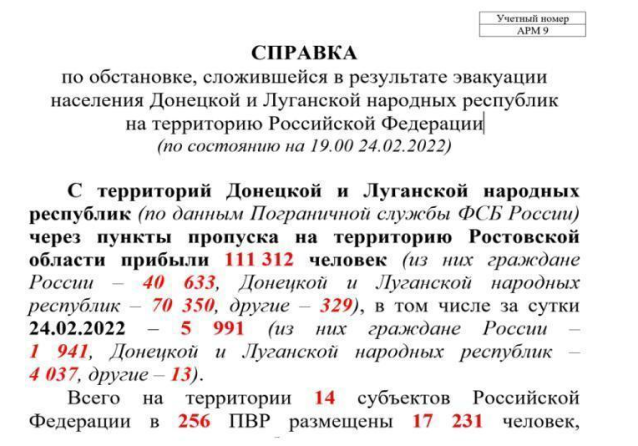
(Number of people, according to the statistics of the Border Guard Service of the FSB of Russia as of 19.00, 24.02.2022. According to: slidstvo.info)
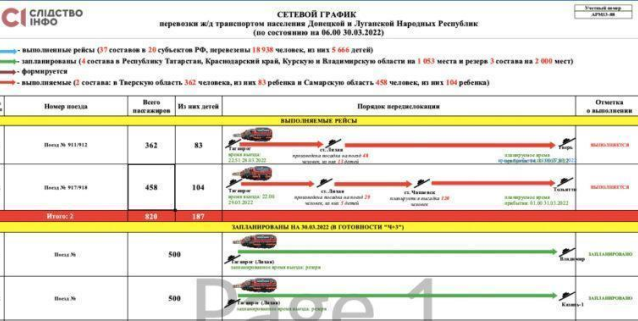
(Schedule of transportation of Ukrainian population from the occupied territories of Donetsk and Luhansk regions to the territory of the Russian Federation. As of 6.00, 30.03.2022. According to: slidstvo.info).
Upon their arrival in the Russian Federation, deported Ukrainians are housed in temporary accommodation centers (TACs). The Russian Ministry of Emergency Situations has developed specific guidelines on how to set up these centers, their capacity, and the conditions provided.
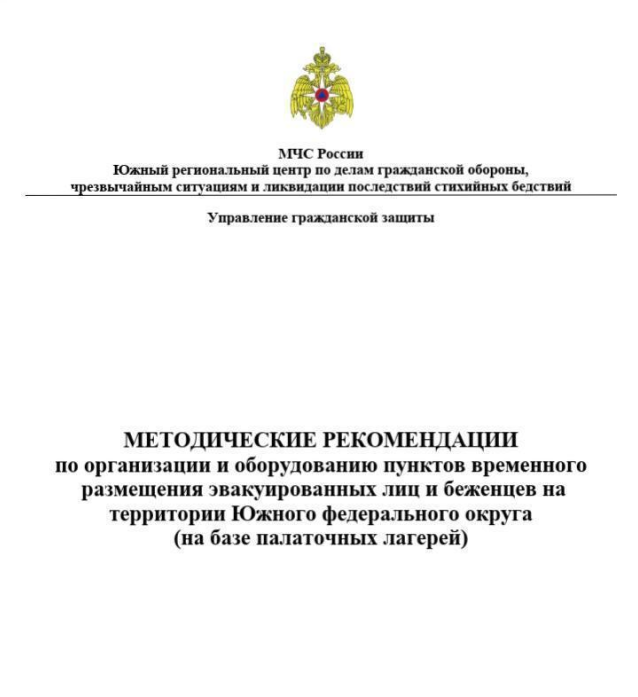
(Methodical recommendations on the organization and arrangement of temporary accommodation centers for refugees. Documents of the Ministry of Emergencies of the Russian Federation, Rostov-on-Don)
Once forcibly deported to Russian territory, Ukrainians are encouraged to register at a temporary accommodation center.
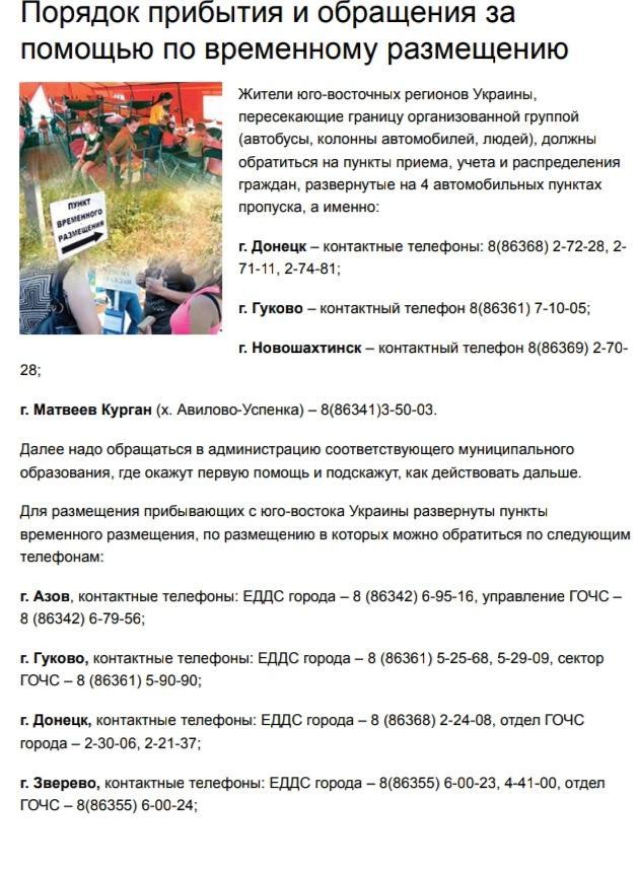
(Contact numbers to apply for registration in temporary accommodation centers)
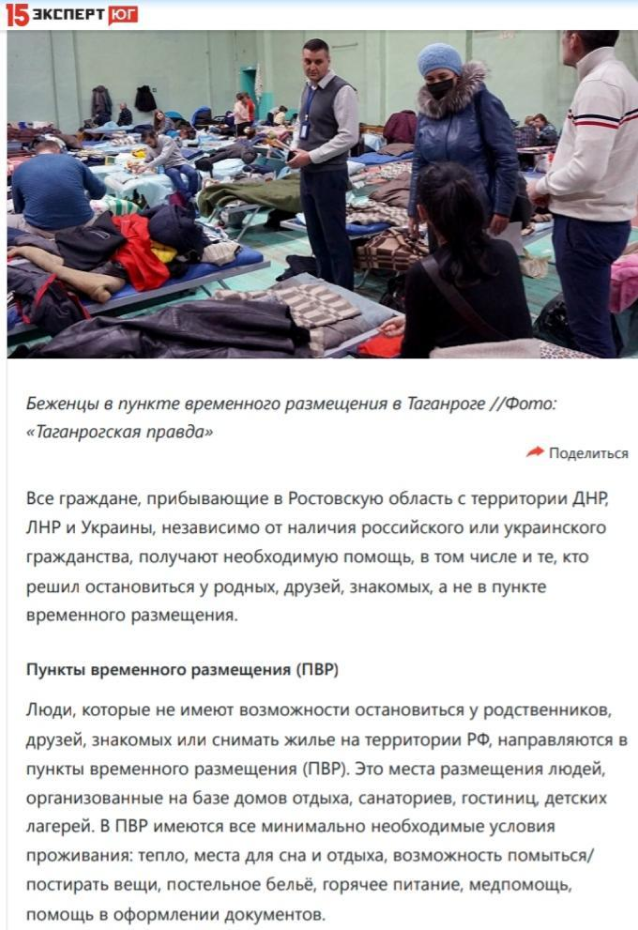
(Description of living conditions in temporary accommodation centers in the Russian media)
The most well-known resettlement sites for deported Ukrainians are monasteries and charity institutions of eparchies in the border regions with Ukraine. Notably, the sports and recreation complex “Romashka” in Neklinovsky district, Rostov region, is one such location. A post on diaconia.ru dated February 28, 2022, detailed Metropolitan Mercurius of Rostov’s visit to this facility and mentioned the displacement of 500 children from two boarding schools and a social rehabilitation center in the Donetsk region.
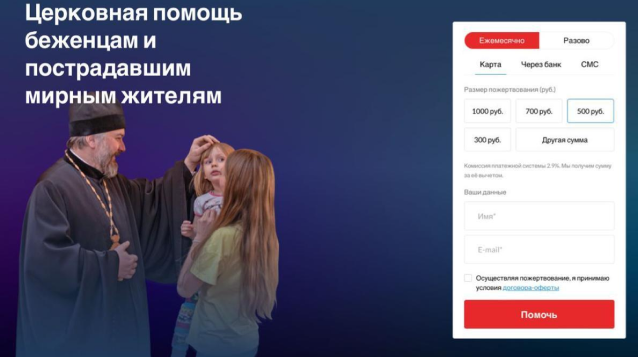
(Website помочьвбеде.рф, where they raise funds for deported Ukrainians)
Furthermore, a February 26, 2022 post on the official website of the Moscow Patriarchate reported the placement of different groups of deported Ukrainians in various locations. This included 30 individiuals at the Iveron Convent of the Rostov Diocese; 23 children, 21 of whom were from an orphanage in the Donetsk region, were placed in Novocherkassk; and an additional 40 individuals were accommodated in a church institution of the Shakhtyn Diocese of the Don Metropolis. The “refugee assistance” report dated April 20, 2022, also mentions shelters in Manichskaya village, Kamensk-Shakhtinsky, and church refugee accommodation centers in the Assumption Monastery of the Tver Diocese, the diocesan mother and child center in Belgorod, and the Kovalevsky orphanage of the Kostroma Diocese.
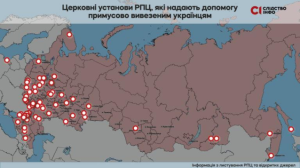
Fundraising to the church accounts of the Russian Orthodox Church can only be conducted only with the permission of the church head, Patriarch Kirill of Moscow. A letter dated March 3, 2022, prepared and sent to the internal mail of the episcopate of the Russian Church, marked the start of collecting humanitarian aid for displaced Ukrainians. It detailed the specific items to be collected and the individuals responsible for this collection.
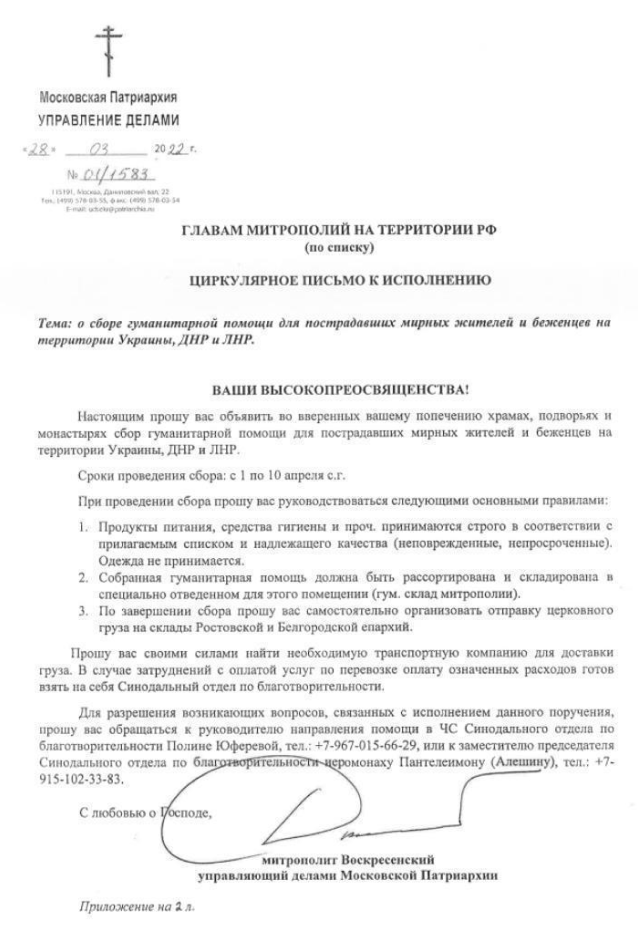
(Circular letter on collecting humanitarian aid for “refugees” signed by the ROC Chancellor Metropolitan Dionysius)
According to diaconia.ru, the official website of the Synodal Department for Charity and Social Service of the Russian Orthodox Church, the total funds collected as of November 22, 2022, amounted to 249.3 million rubles, as stated in the post “to help refugees and victims in the conflict zone”. Aside from this, in March 2022 alone, tens of millions of rubles were raised. For example, the Tver Diocese alone collected five tons of humanitarian aid and 2.1 million rubles. From the Kuban Metropolis, which encompasses several dioceses, 9 million rubles were raised. Furthermore, substantial donations have been made by large business entities; for example, Norilsk Nickel allocated 4.4 million rubles for assistance.
In 2022, an online platform was established, functioning as a hotline for church assistance to refugees and victims of “conflict”. This platform reveals te existence of three separate headquarters in regions bordering Ukraine: the Rostov-on-Don headquarters at Orbitalnaya Street, 1b (Church of the Intercession of the Blessed Virgin Mary); the Belgorod headquarters at Pushkin Street, 19 (Marfo-Mariinsky Monastery); and the Voronezh headquarters at Fabrychny Lane, 8 (Tikhvin-Onufrievsky Church). The proximity of these resources to the Ukrainian border, coupled with their operation since 2022, indicates a focus on resettling deported Ukrainians. Over the nine months of Russia’s full-scale invasion of Ukraine, the number of dioceses involved in “helping” refugees in Russia has also expanded. While initial reports (dated March 1, 3, and 4, 2022) from the official website of the Department for Charity and Social Service of the Russian Orthodox Church mentioned 30 dioceses, this number grew to approximately 52 by April 19, 2022. The official report of November 17, 2022, also cites 58 church institutions where deported Ukrainians are held.
Analyzing these data, it becomes evident that these temporary accommodation centers — effectively places of forced residence for deported Ukrainians in the Russian Federation — are not the sole locations for deportees.
The deportation process itself is executed not only to displace Ukrainians from the occupied territories as part of Russia’s genocidal project, but also to address Russia’s demographic problems. The primary focus here is on children, who are often taken into Russian families and are susceptible to propaganda and misinformation about the Russian-Ukrainian war. This situation significantly hampers the process of their return.
Therefore, the primary objectives are to assist these individuals in establishing contact with the Ukrainian authorities and/or their families through international human rights organizations, to gather as much information as possible about Russia’s accommodation centers, including the living conditions therein, and to compile all available data on deported children who have been placed in orphanages and church institutions within the Russian Federation.
Vladyslav Havrylov, author
Oleksii Havryliuk & Maksym Sushchuk, editors
Subscribe for our news and update
On September 30, Russian troops broke into a house where a 16-year-old teenager (we keep his name anonymous), lived with his grandmother. It was late at night and there was no reason for such vandalism.

Investigate the Soviet-era policies that led to mass relocations. A detailed look at the struggles and resistance of Ukrainian peasants.
The boy went missing and there were no clues that he survived the shelling. After a while, Pasha’s father, Denis, received a message with a video featuring his son.
and we will send you the latest news